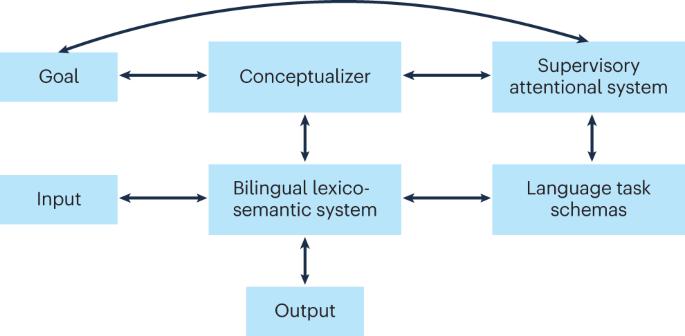The relationship between bilingual language use and executive functions
IF 16.8
Q1 PSYCHOLOGY, MULTIDISCIPLINARY
引用次数: 1
Abstract
There is continuing debate over whether bilingualism can confer advantages in other areas of cognition. Bilingual language behaviours, such as switching between languages, are often assumed to engage domain-general executive functions that control and regulate behaviour. According to this account, language switching might also improve executive functions used for nonverbal tasks. An alternative account suggests that bilingual language behaviours are skills that become automatic with practice and come to rely on task-specific processes instead of domain-general executive functions. According to this account, repeated training in bilingual language behaviours would not enhance executive functions generally. In this Review, we examine cross-sectional and longitudinal research on language switching and executive function in language users with and without cognitive deficits in order to compare the domain-generality and skill-learning accounts. We also discuss how these results converge with the findings of task specificity in the cognitive training literature suggesting that training does not generalize to other tasks. We hope to stimulate further research contrasting these two accounts, with the goal of a better understanding of the relationship between bilingualism and cognitive control and whether it is possible to train executive functions via bilingual language behaviours. Debate exists regarding whether using multiple languages confers cognitive advantages beyond the language domain. In this Review, Lehtonen and colleagues contrast domain-generality and skill-learning accounts of bilingualism, considering how bilingual language use interacts with executive functions across levels of language proficiency.

双语语言使用与执行功能的关系
关于双语是否能在其他认知领域带来优势的争论仍在继续。人们通常认为,双语行为,如语言之间的转换,会调动控制和调节行为的领域一般执行功能。根据这种说法,语言转换也可能改善用于非语言任务的执行功能。另一种观点认为,双语语言行为是一种通过练习自动形成的技能,依赖于特定任务的过程,而不是一般领域的执行功能。根据这种观点,对双语语言行为的反复训练不会增强一般的执行功能。在这篇综述中,我们考察了对有认知缺陷和无认知缺陷的语言使用者的语言转换和执行功能的横向和纵向研究,以比较领域通用说和技能学习说。我们还讨论了这些结果如何与认知训练文献中关于任务特异性的研究结果趋于一致,后者表明训练并不能推广到其他任务。我们希望通过这两种观点的对比,激发进一步的研究,从而更好地理解双语与认知控制之间的关系,以及是否有可能通过双语语言行为来训练执行功能。关于使用多种语言是否会带来语言领域以外的认知优势,目前还存在争议。在这篇综述中,Lehtonen及其同事对比了二语习得的领域普遍性和技能学习说,探讨了二语使用如何与不同语言水平的执行功能相互作用。
本文章由计算机程序翻译,如有差异,请以英文原文为准。
求助全文
约1分钟内获得全文
求助全文

 求助内容:
求助内容: 应助结果提醒方式:
应助结果提醒方式:


